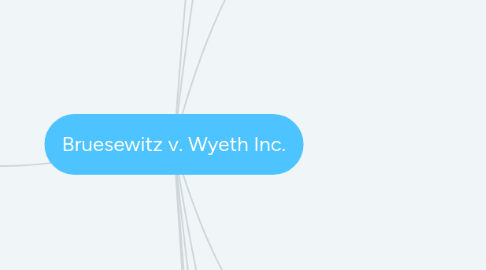
1. Derrik L Karst (Section 34 - Spring II 2017)
2. Facts
2.1. Parties
2.1.1. Plaintiff: Russell and Robalee Bruesewitz
2.1.1.1. Parents of Hannah Bruesewitz who was administered Wyeth's DTP vaccines
2.1.2. Defendant: Wyeth Inc.
2.1.2.1. Developer and manufacturer of various medical products - in this case, a children's vaccine.
2.2. What happened
2.2.1. Six-month-old Hannah was given a dose of Wyeth's DTP vaccine.
2.2.1.1. The dose was given in accordance with CDC recommendations.
2.2.2. The same day, Hannah began experiencing seizures - more than 100 over the next month.
2.2.2.1. Hannah was later diagnosed with residual seizure disorder and developmental delay
2.3. Procedural history
2.3.1. The Bruesewitz's filed a vaccine-injury petition the U.S. Court of Federal Claims under the National Childhood Vaccine Injury Act (NCVIA)
2.3.1.1. NCVIA: Set up as a no-fault, injury compensation program for people injured by vaccines
2.3.1.1.1. NCVIA was enacted to assuage concerns about the risks of vaccines, to streamline compensation, and to bring stability to the vaccine market
2.3.1.2. The NCVIA claim was denied
2.3.1.2.1. Hannah's disorder had been recently removed from the list of disorders eligible for compensation.
2.3.2. The Bruesewitz's filed a suit against Wyeth in Pennsylvania state court alleging strict product liability and liability for negligent design.
2.3.3. Wyeth moved the claim to the Federal District Court.
2.3.3.1. District court gave Wyeth summary judgement: NCVIA preempted claim and protects vaccine manufacturers from liability for side effects.
2.3.4. Third Circuit affirmed the decision
2.3.5. Buesewitzes appealed to US Supreme Court
3. Issue
3.1. Whether a federal law (the NCVIA) preempts design-defect claims in state courts and shields vaccine manufacturers from lawsuits alleging product liability damages caused by children's vaccines.
4. Rule of Law
4.1. Strict product liability
4.1.1. Plaintiff must prove:
4.1.1.1. The product was in defective condition when sold.
4.1.1.2. Defendant is normally engaged in the business of selling that product.
4.1.1.3. The product was unreasonably dangerous due to its defectiveness.
4.1.1.4. Plaintiff incurred physical harm by using defective product.
4.1.1.5. Defective condition was main cause for injury.
4.1.1.6. Product was not substantially changed from the time of sale to the time of injury.
4.2. National Childhood Vaccine Injury Act (NCVIA)
4.2.1. Enacted by Congress as a means of both compensating injured children and providing stability for vaccine firms.
4.2.2. Why? Side effects of vaccines are unavoidable
4.2.2.1. Potential liability of injury lawsuits pushes vaccine manufacturers out of the market
4.2.3. Provides compensation for injuries; meanwhile, vaccine manufacturers are not liable for vaccine-related injuries or death from unavoidable side effects
4.3. Supremacy Clause
4.3.1. Federal law preempts state law
5. Application
5.1. Plaintiff: Bruesewitz
5.1.1. Argues damages under strict liability
5.1.1.1. The plaintiff's argument is less relevant because of defendant's argument that...
5.2. Defendant: Wyeth Inc.
5.2.1. Argues that NCVIA protects it from state torts
5.2.1.1. This falls in line with Congress's intention for NCVIA
5.2.1.1.1. Side effects cannot be completely avoided
5.2.1.1.2. Wyeth complied with regulation and the vaccine was administered per recommendations.
5.2.1.1.3. Wyeth (like other compliant vaccine makers) is immune from strict product liability as a matter of law and public interest
5.2.1.2. Federal law preempts state law
5.2.1.2.1. Therefore, questions regarding vaccine's design cannot be brought under tort case
6. Conclusion
6.1. Supreme Court affirmed decision: NCVIA preempts Bruesewitz's claim in state court for compensation under strict product liability.
6.1.1. Reasoning: Congress enacted NCVIA as a matter of public policy. Intent was to provide compensation to injured children while also protecting the vaccine industry.
6.1.1.1. Number and cost of injury lawsuits drives vaccine manufacturers out of the market
6.1.1.2. Negative effect on society: less vaccines and vaccine development
7. Impact
7.1. Mutual Pharmaceutical Co., Inc. v. Bartlett (2013)
7.1.1. After being ordered to pay $21m for a design defect claim, a drug manufacturer appealed to Supreme Court.
7.1.2. Reversed: Similar to Bruesewitz v. Wyeth Inc., the court found that federal law concerning drug labeling preempted state laws
7.1.3. Court noted that absent Congressional act like NCVIA, the decision leaves consumers "to bear enormous losses on their own."
7.2. Milik v. Secretary of Health and Human Services
7.2.1. Petitioners' son developed neurological condition after receiving an MMR vaccine; US Court of Federal Claims denied claim, so parents appealed.
7.2.2. Petitioners cited Bruesewitz v. Wyeth Inc. to get new review of the decision.
7.2.3. Affirmed: court found that petitioners failed to prove link between MMR vaccine and condition and that special masters decision was conducted appropriately.
8. Importance
8.1. Why should we as business professionals care?
8.1.1. In some cases, public policy and federal law affects application of strict product liability and other tort protections
8.1.1.1. Congress may act when state torts could jeopardize federal objectives
8.1.2. Strict product liability = a BIG concern for businesses
8.1.2.1. In this case, a product that was deemed unavoidably unsafe, was granted certain immunities from strict product liability.
9. Influence
9.1. How are business practices affected?
9.1.1. Vaccine companies are protected ONLY if they are in compliance with the law.
9.1.1.1. Takeaway: it is extremely important to understand the laws affecting your business... otherwise you open yourself up to more liability and possibly forego certain protections.
9.1.2. Drug and vaccine makers are able to market new offerings after FDA approval without fear of tort liability
9.1.2.1. Provides more stability and predicability... and even competition and innovation... in drug and vaccine industries.
